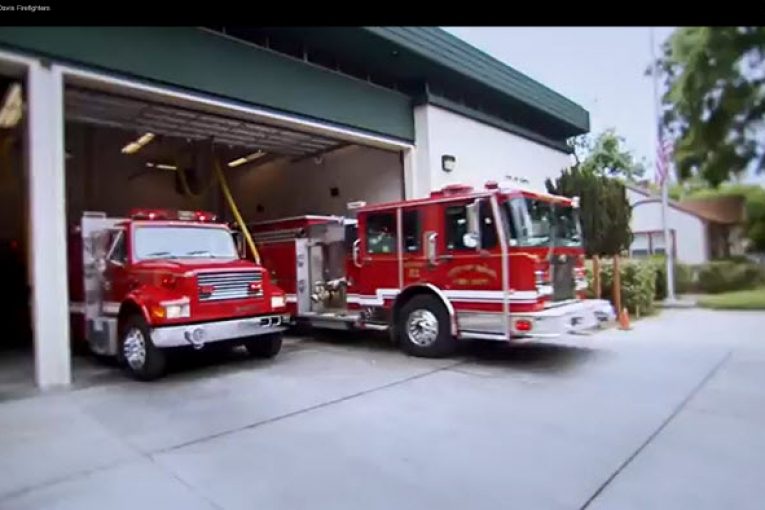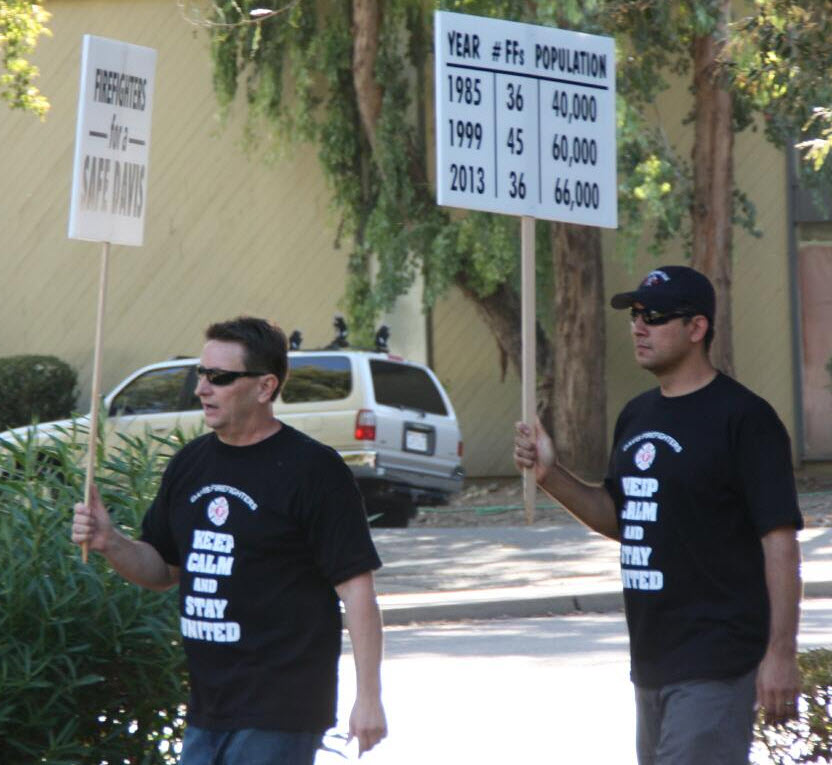

A PERB (Public
Employee Relations Board) ruling in December denied claims by the Davis Professional Firefighters Association and Union President Bobby Weist that a decision to deny Mr. Weist vacation time and to put him on PIP status was motivated by his union activities and retaliation for his protesting of city policies and failure to agree to bargaining agreements.
PERB concludes, “Based upon the foregoing findings of fact and conclusions of law and the entire record in this matter, the complaint and underlying unfair practice charge in Case No. SA-CE-833-M, Davis Professional Firefighters Association, Local 3494 v. City of Davis are hereby DISMISSED.”
In August of 2013, the Vanguard reported that the Davis Professional Firefighters Association had filed an Unfair Labor Practices Complaint against the City of Davis alleging that in March and April 2013, the City discriminated/retaliated against Union President and Chief Negotiator Bobby Weist by denying his request for vacation leave and issuing him a performance improvement plan (PIP), and unilaterally changed policy by issuing the PIP, in violation of the Meyers-Milias-Brown Act.
PERB notes in their decision, “The City answered the complaint on May 2,2014, admitting five allegations, denying all substantive claims, and asserting affirmative defenses. A May 28 informal settlement conference did not resolve the dispute.”
On July 21, an amended complaint was issued, adding an allegation that the City unilaterally changed policy for vacation leave of less than 24 hours by denying Captain Weist’s request. On September 9 and to, 2014, formal hearing was held in Sacramento.
The facts are laid out in the PERB Complaint and also in the original Vanguard article.
The Davis City Fire Department is in the West Valley Yolo County consortium with other departments. Captain Weist and his crew were scheduled for training on March 13.
“Weist reported for his 24-hour shift at 8:00 a.m. on March 13, 2013. He was having trouble breathing and was out of his inhaler, so he completed the same day vacation leave request to go to the doctor that afternoon. Weist was the Station 31-downtown Fire Captain in charge of scheduling for all three fire stations on A Shift, and approved his own same day vacation request after determining no other Captain would be absent. He put the completed Fire Department form in Chief Kinney’s mailbox before noon, seeking to leave at 1530 hours. Weist did not ask to use sick leave because his accrued vacation hours were over the carryover limit. When he submitted the vacation request, Weist was not aware that he and his crew were scheduled for the multi-agency training that night.
“Chief Kinney received Weist’s same day vacation request after 1500 hours. He heard Weist loudly complaining about the training as ‘BS’ earlier. Kinney looked at the 2009-2012 MOU, and called Deputy/Assistant Chief Pierce at the Police Station. Kinney told Pierce that Weist had requested vacation; he did not think ‘we’ should grant it because the consortium training was an important and unique opportunity, and Weist and his crew were deficient in training. They discussed whether the contract allowed denial of the request, and if Weist and his crew could be rescheduled for another training session. Pierce agreed with Kinney’s recommendation to deny Weist’s vacation.
“Chief Kinney informed Weist that his vacation request was denied. Weist responded that he was sick and had to go to the doctor. Kinney replied that Weist should go home if he was sick. After arranging for overtime coverage, Weist left the station, went to the doctor, and obtained an inhaler and medical note.
“The March 13, 2013 consortium training was cancelled because of a fire in Woodland to which City Fire Station 32 crew responded and rendered assistance. One of Weist’s crew attended a subsequent training session. Sixteen City Fire Department employees did not attend any of the seven multi-agency training sessions; 24 participated.
“As of March 13,2013, Weist had completed 71.5 of the required 120 1ST training hours as of the six month/half year report.”
Ruling
In PERB’s ruling, they noted that “Fire Captain Weist engaged in protected activities for 27 years as Local 3494 President and Lead Negotiator for over 22 years, and the City is well aware of these acts.”
PERB writes, “The March 2013 decision to deny Weist’s same day vacation request was jointly made by Chief Kinney and Assistant Chief Pierce based on the scheduled multi-agency training for him and his crew, and their lack of required training hours at the time. The April 2013 decision to give Weist a PIP was also a concurrent one, made by Chiefs Fry and Pierce, based on his deficient performance in several administrative functions in addition to training.”
PERB notes that there is no evidence of Mr. Pierce’s anti-union animus towards Captain Weist nor did he “participate in any City decisions on issues where Weist advocated for the Union. Kinney and Fry were longtime bargaining unit employees who recently promoted out of the unit; Fry was a Union officer who wanted to continue his membership.”
Moreover, PERB notes, “The employer met that burden and established valid affirmative defenses for the same reasons. The City demonstrated that it had alternative, non-discriminatory, permissible reasons for its actions and acted because of them, and not because of Weist’s protected conduct..”
“Chief Kinney recommended and Chief Pierce concurred in denying Weist’s same day vacation leave request because the March 2013 consortium training would be valuable for him and his crew, and they had not completed required 1ST training hours. Chief Pierce suggested that Chief Fry issue a PIP to Weist in April 2013 after reviewing performance deficiencies documented in his annual evaluation, and Fry agreed. Both actions would have occurred “but for” Weist’s protected activity,” they write.
The union also contends that the city unilaterally changed the conditions of employment by issuing the PIP outside of the normal collective bargaining process. PERB notes, “An employer does not make an unlawful unilateral change if its actions conform to the terms of the parties’ agreement.” Moreover, “The mere fact that an employer has chosen not to enforce its contractual rights does not mean it is forever precluded from doing so.”
PERB argues, “Charging Party Local 3494 failed to meet its burden of establishing that the City made unlawful unilateral changes in policy or past practice in same day vacation leave requests or issuing PIPs to Fire bargaining unit employees, based on the same reasons for dismissing the discrimination/retaliation claims.”
They note, “Although the Fire Department had never used PIPs, it is uncontroverted that they are routinely used by other City Departments, such as Police, under the City’s performance evaluation policy which applies to all departments. Weist’s PIP was terminated by the new Fire Chief in May 2014, less than a year after it took effect. No PIPs have been issued to Fire bargaining unit employees before or since Weist received one in April 2013.”
—David M. Greenwald reporting

so let me get this straight – weist tries to take a vacation during training after he is heard loudly complaining about having to do the training, when he’s denied, he attempts to take sick leave. when he gets written up, he files a complaint to perb which makes this whole embarrassing incident public and then his complaint is denied. nice job mr. union president.
Davis wrote:
> A PERB ruling in December denied claims by the Davis
> Professional Firefighters Association
I bet there is a short list of people that know what “PERB” is, so others don’t have to Google it Like I did:
The Public Employment Relations Board (PERB or Board) is a quasi-judicial administrative agency charged with administering the collective bargaining statutes
they may not know what perb is, but they know a butt kicking when they see one
As a community I’ll never understand why we put up with some of the crap that comes from our well compensated firefighters.
If it’s “crap”, what should it matter if the employee is under-paid, adequately-paid, well-paid, or grossly-overpaid? Crap is crap.
Seems like your “point” has little to do with “crap”, but everything to do with your view of the FF’s compensation. Not disagreeing or agreeing on THAT point, just, please be honest.
hpierce wrote:
> If it’s “crap”, what should it matter if the employee is under-paid,
> adequately-paid, well-paid, or grossly-overpaid?
I don’t want to speak for BP, but I’m OK if a guy that cleans toilets (or porta potties) for minimum wage complains about his job and give his supervisors a little “crap” (knowing that we can’t get anyone to do the job for less). I would not be as OK is say someone like UCs Janet Napolitano (who makes more than the President of the United States AND the Governor of California COMBINED) gives me “crap” about her job (knowing we could get someone better to do the job for half as much)…
I wonder how much money was spent by the city on this incident? It would be nice to dock Weist the cost of this little episode. Antics like this will not get any popular support for firefighters when contract time comes.
One of the most astonishing revelations with this ruling is the remark that the Davis Fire Department had never previously issued a Performance Improvement Plan (PIP) in its entire history as a public service agency.
PIP’s are common supervisory tools used throughout municipal government (and likely elsewhere) and is given to sub-standard performing employees. It gives formal notice to an employee as a prelude to formal discipline. Within a specified time-frame, the noticed employee is required to meet enumerated performance standards, or else.
Several observations are apparent with this public disclosure. Either the Davis Fire Department is, and always has been, populated by employees of consistent and extraordinary behavior, OR the level of supervision and inspection has been historically deficient or absent. The fact that a PIP is issued to a supervisor is remarkable. Supervisors usually issue PIP’s, and to receive one compromises his/her ability to model appropriate behavior.
May have missed it, but what has happened to the completion of the PIP? Or is that a personnel matter?
Details are a “personnel matter”. In general, if an Employee completes the requirements of the PIP (modifies/corrects the behaviors that prompted the PIP), they can, in effect, be taken ‘off probation’. Have no clue what the facts are in this example.
He was removed from that status in spring 2014.
You said that, David, I think the real question was to “why/how”, not “when.
And how does that square with the 2014 decreased training accomplished as described by David and the Chief?
All it says – twice – “The PIP was terminated in May 2014 by the new Fire Chief after less than a year in effect.”